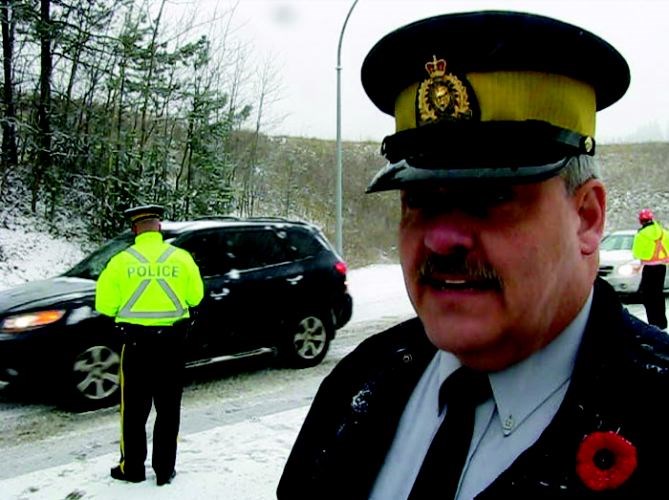Two crashes within 10 blocks and one hour.
Sleety snow pelting down.
Morning commute in high gear down the Hart Highway.
No better time and no better place, said the Winter Driving Safety Alliance, to remind drivers of good winter driving behaviour.
The alliance is comprised of ICBC, WorkSafeBC, the provincial Commercial Vehicle Safety and Enforcement unit, Prince George RCMP, North District RCMP, and help from highway maintenance company YRB. They stood shoulder to shoulder on Wednesday morning, diverting Hart Highway southbound traffic through the provincial weigh scales in order to hand out winter driving pamphlets and remind motorists of the dangers of not driving to winter conditions. A lineup of vehicles was forced to take a moment and consider the message.
"Doing this awareness campaign in these conditions only make the point even stronger," said ICBC's Diana Pozer. "You have to be prepared to drive for the conditions of winter. You have to be able to stop yourself in snow the same way you would in summer, only you have the extra challenges of less visibility, less traction, so how are you changing your driving to meet these challenges?"
She said the same tactic had been done in previous weeks in four other locations around the region and more would be done.
"For the most part, people are reacting positively, the communities are welcoming this, and I like it because it shows the public just how many different agencies are all working together on this important message," she said.
One driver wheeled in and attempted to blame the allied authorities' lineup for causing one of the collisions up the road, a three-car incident of rear-ending one into the next. Several witnesses were on hand to confirm the call came in to emergency responders prior to the traffic diversion. Those in the various uniforms at the roadcheck said it was one more example of what driver accountability sometimes looks like.
"The driver who caused that crash was driving while prohibited, she had no valid drivers license, and in fact was supposed to have a breath-lock installed in her vehicle from a past alcohol-related incident but it wasn't installed, so she now has a date with a judge," said RCMP Sgt. Al Steinhauser who attended to the crash and came later to the education line.
"It's just an information session," said RCMP Staff Sgt. Pat McTiernan, one of the key organizers of the campaign. "It takes 30 seconds, they come through, get their package, move on, and it has a lot of information that will help them prepare for driving in the adverse winter driving conditions.
"The way we're looking at it is, for the time it is taking us to provide this information to them, maybe, just maybe, we can prevent a serious crash on the highway, and slow people down, and get people ready. The cause is good."
About 400 drivers were presented with an education package on Wednesday intermittently between 9 a.m. and 10 a.m.
========
November 1 to 30 marks the Provincial Speed Relative to Conditions Campaign in British Columbia. Police officers across the province will be watching for those drivers who do not adjust their driving behavior to the ever changing weather and road conditions.
"Roads and driving conditions can become hazardous in a matter of minutes," said provincial RCMP Traffic Services Sgt. Pierre Lemaitre, a veteran of northern B.C. law enforcement. "If drivers don't adapt quickly, bad things can happen fast."
The charge of Speed Relative to Conditions carries a fine of $167 and 3 driver penalty points.
"The officer may consider other more serious charges when appropriate," said Lemaitre.
Drivers are reminded to:
Plan well in advance of a trip. Check travel and weather conditions on local and provincial TV, radio, and internet.
Be realistic about travel times, especially in bad weather.
Slow down and keep your distance, particularly while driving in rain, fog, snow or on icy roadways.
Do not use cruise control in wet or slippery conditions. An activated cruise control in wet conditions gives you less control of being able to stop your vehicle.
Driving a vehicle such as an SUV or 4x4 should not give you the confidence that you are safer because you have all-wheel-drive. All-wheel-drive is a great benefit in some slippery conditions for acceleration, but in those same conditions it will not help you stop faster or turn corners at higher speeds.
Remember that roads are the slickest when it first starts to rain.
In snow and ice conditions, if you begin to lose control, don't slam on your brakes. Simply ease off on the accelerator, then gently apply brake pressure and steer in the direction you want to go.
Make sure your tires have good tire tread and are inflated correctly, including your spare tire. If you live in an area that regularly receives snow or are required to drive in areas with winter conditions, then your vehicle should be outfitted with a complete set of winter tires.
Clean all your windows, not just your front windshield.



